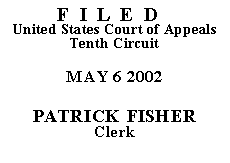

| UNITED STATES OF AMERICA, |
|
On remand, the district court sentenced Mr. Anderson to 327 months imprisonment for the affirmed drug convictions. During the sentencing hearing on remand, Mr. Anderson's defense counsel argued the impact of Apprendi v. New Jersey, 530 U.S. 466 (2000), which the Supreme Court had decided fourteen days earlier. The district court rejected the Apprendi argument, stating that it was not applicable because Mr. Anderson had received a sentence within the statutory maximum. See II Aplt. App. at 9 (Doc. 1036).
Mr. Anderson filed his notice of appeal pro se, but we appointed counsel to represent him in this appeal. Mr. Anderson's counsel has now filed an Anders brief seeking leave to withdraw because any further proceedings on his behalf would be wholly frivolous and without arguable merit. See Anders v. California, 386 U.S. 738 (1967). Mr. Anderson has filed pro se response and reply briefs to the briefs of his counsel and the Government, respectively. His claim on appeal is that the district court violated Apprendi because it failed to instruct the jury as to drug type and quantity and that it enhanced his sentence based upon drug amounts not found by a jury. We agree that this argument is without merit and will therefore grant counsel's motion for leave to withdraw.
Mr. Anderson claims that because the district court did not instruct the jury on drug type and amount that he should have been convicted pursuant to 21 U.S.C. § 841(b)(1)(C) as opposed to §§ 841(b)(1)(A) or (b)(1)(B). Assuming he is correct, the Apprendi argument would still fail. Apprendi held that "[o]ther than the fact of a prior conviction, any fact that increases the penalty for a crime beyond the prescribed statutory maximum must be submitted to a jury, and proved beyond a reasonable doubt." Apprendi, 530 U.S. at 490. Mr. Anderson was convicted of both conspiracy and possession with intent to distribute and was therefore subject, assuming § 841(b)(1)(C) applied, to two separate twenty-year maximum sentences. Under United States v. Price, 265 F.3d 1097 (10th Cir. 2001), the district court was required to apply section 5G1.2(d) of the Sentencing Guidelines. See id. at 1109 (holding that section 5G1.2(d) is a mandatory provision). Section 5G1.2(d) provides that:
[i]f the sentence imposed on the count carrying the highest statutory maximum is less than the total punishment [arrived at through application of the Guidelines], then the sentence imposed on one or more of the other counts shall run consecutively, but only to the extent necessary to produce a combined sentence equal to the total punishment.
As a result, section 5G1.2(d) required the district court to combine Mr. Anderson's two sentences to equate the 262 to 327 month sentence he would have received under the Guidelines. See II Aplt. App. at 45 (noting applicable Guideline sentence); see also Price, 265 F.3d at 1109 (stating that section 5G1.2 required the district court to run sentences consecutively to approximate the Guideline sentence of life imprisonment).
Thus, the district court did not impose a sentence beyond the statutory maximum and Apprendi is not implicated. See United States v. Thompson, 237 F.3d 1258, 1262 (10th Cir. 2001). Further, Mr. Anderson's suggestion that the district court inappropriately enhanced his sentence based upon drug quantities not found by the jury is, quite simply, incorrect. We have held, subsequent to the Apprendi decision, that judges may "ascertain drug quantities by a preponderance of the evidence for the purpose of calculating offense levels under the Sentencing Guidelines, so long as they do not sentence above the statutory maximum for the jury-fixed crime." United States v. Heckard, 238 F.3d 1222, 1236 (10th Cir. 2001) (citation omitted).
Accordingly, we AFFIRM the district court. Appellate counsel's request for leave to withdraw is GRANTED. All other pending motions are DENIED.
Entered for the Court
Paul J. Kelly, Jr.
Circuit Judge
*. This order and judgment is not binding precedent, except under the doctrines of law of the case, res judicata, and collateral estoppel. This court generally disfavors the citation of orders and judgments; nevertheless, an order and judgment may be cited under the terms and conditions of 10th Cir. R. 36.3.
2. After examining the briefs and the appellate record, this three-judge panel has determined unanimously that oral argument would not be of material assistance in the determination of this appeal. See Fed. R. App. P. 34(a); 10th Cir. R. 34.1(G). The cause is therefore ordered submitted without oral argument.